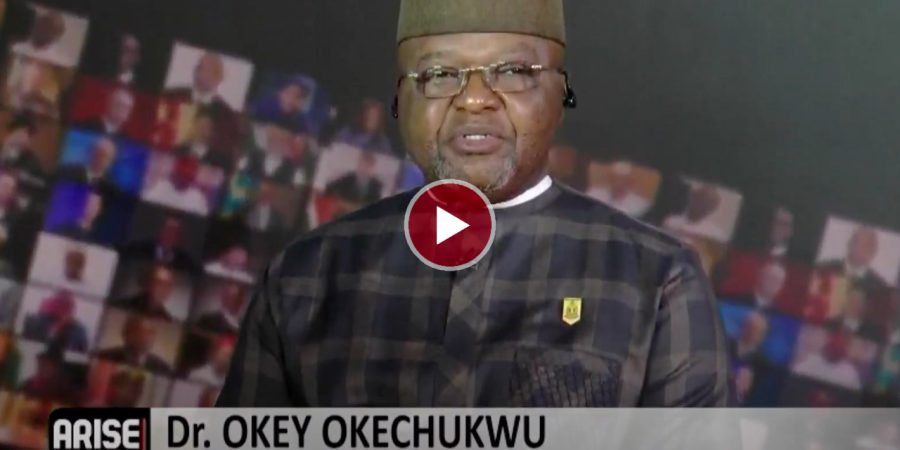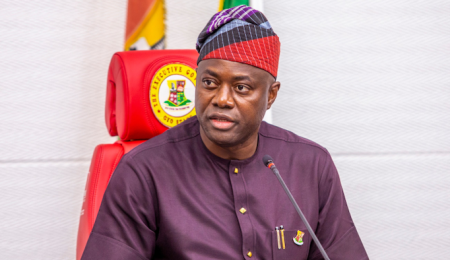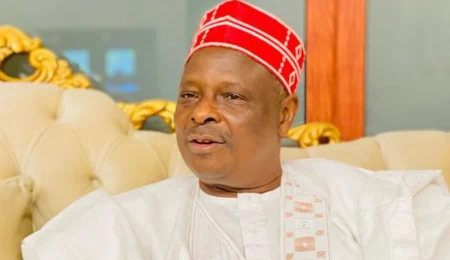Political analyst and public affairs commentator Dr Okey Ikechukwu has warned that efforts within the All Progressives Congress (APC) to predetermine or influence the choice of a vice-presidential candidate ahead of the 2027 general election pose a serious threat to internal party cohesion and democratic principles.
Ikechukwu said this in an interview with ARISE NEWS on Tuesday after fresh cracks erupted within the APC following a chaotic stakeholders’ meeting in Gombe, where Vice President Kashim Shettima was conspicuously excluded from a proposed 2027 joint ticket with President Bola Ahmed Tinubu.
The omission triggered outrage among party loyalists, leading to a breakdown of order, physical confrontations, and visible signs of a deepening rift in the party’s Northeast bloc.
Reacting to the incident, Ikechukwu, described the development as a dangerous signal of internal collapse.
He warned that the growing pattern of public defiance and disunity especially over core leadership decisions undermines party discipline, erodes trust in the presidency, and raises troubling questions about whether the president still retains the freedom to choose his running mate.
“Then there was a meeting of the Northern Governors, or was it the, I think, Council of State chaired by the Vice President. This is the party in power. This is the substantive president in the absence of the president if he travelled. And what we had was opposition to that bill. How does that make the member of the presidency, who’s from the North, look? So when you have that and you have this again, you ask yourself, are they really helping the Vice President?
“Are they suggesting, for instance, that the president cannot choose another candidate? So this is very bad at three levels, at the level of party cohesion and party discipline and party leadership, at the second level of solidarity within the presidency, and at the third level of the question of trust between the two people who hold the reign of power, one substantively, the other in a supporting capacity. It’s a very dangerous development.”
Ikechukwu criticised the open defiance within APC ranks, where disagreements over leadership choices have played out publicly with “insults and stone-throwing,” saying, “Party discipline should make it possible for party members to know when the party has taken a decision, there can not be an alternative point of view in the public domain coming in the form of insults and throwing of stones.”
He also cautioned that these public disputes not only risk damaging the Vice President’s reputation but may be perceived as orchestrated moves to undermine him politically, saying “I think the person who should be concerned and alarmed about this is not just the Vice-president but local government chairman, chairman in the world, state chairman of the party.”
“What kind of members do they have that these sort of thing would happen? With this kind of event, is it not possible that his chief makers would attribute it to the vice president and claim that he mobilised it and if you look at the background of events that have occurred since the last two years that this government came into business.”
He noted past instances, such as Northern governors opposing presidential-backed tax bills even while Shettima acted in Tinubu’s stead. “Remember there was series of task bill, I think four of them and it came from the presidency, then there was a meeting of the Northern Governors, council of states shared by the vice president. This is the party in power, this is the substantive president in the absence of the president when he travelled and what we had was opposition to that bill.”
Ikechukwu stated it is a dangerous development citing failures at three levels. “So this is very bad at three levels at the level of party cohesion, party discipline and party leadership and the second level of solidarity with the presidency and at the third level of the question of trust between the two people who hold the rein of power. One substantively, the other in a supporting capacity it’s a very dangerous development.”
According to him, much of the dysfunction stems from weak party structures at the ward and local government levels. “In fact, it also speaks to what has become the norm, namely that there is really no party activity at the world and local government level such that party discipline doesn’t exist in most of the parties.
“This incident should be a warning not just to APC but to all political parties,” he said, urging regular local meetings and member-driven rallies to restore credibility and engagement. “Create genuine members, let them meet regularly. Rallies are not pre-elections. Party meetings should take place at the world level, at the council level, at the local government level on a routine basis. Have a rally every three months within your state, that’s how parties begins to be real. Not during elections you organise in some cases, give money or hand it over.”
He added, “No, there is one ticket belonging to the APC, but to think that whoever has the presidential ticket can be muscled into whom to choose is a very, very disturbing signal for the party and for politics.”
On the growing debate over religious balance in the 2027 ticket, Ikechukwu acknowledged that the matter of having a Christian candidate should be part of national discourse. “It may not be part of the conversation but I think it should become part of conversation. Also we must look at it against the background of what has transpired in the first two-years of this regime.
However, he criticised religious leaders for being selective in their activism, pointing out that many are vocal during power struggles but silent on corruption or ethical violations by members of their faith. “Is there a clear indication in public consciousness that there is a partiality towards a particular religion because of those in power, people are in equation to answer that themselves.
“But yes for the uptakes and for the sense of equity I think that should be considered going forward but again I would like to add a caveat that you usually hear the various religious groups, the dominant ones, Christian and Muslim leaders talking about tickets, talking about all sorts of things when it comes to power you don’t hear them when you’re speaking of corruption, you don’t see them feeling uncomfortable that some of those accused of corruption are very prominent and visible in their religions, you don’t see them complaining about blasphemy or desecration of a place of worship.”
Erizia Rubyjeana
Follow us on:


